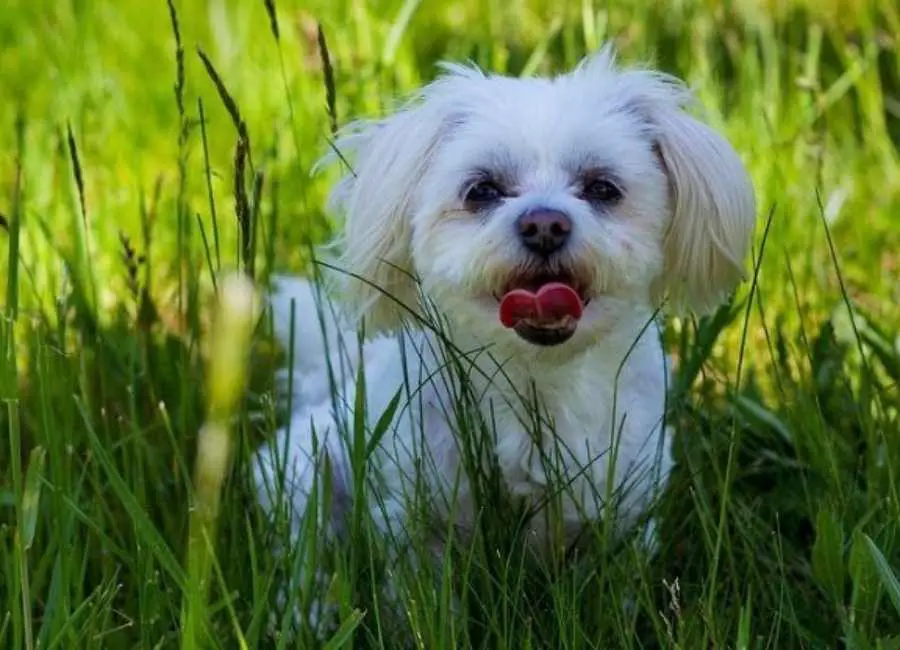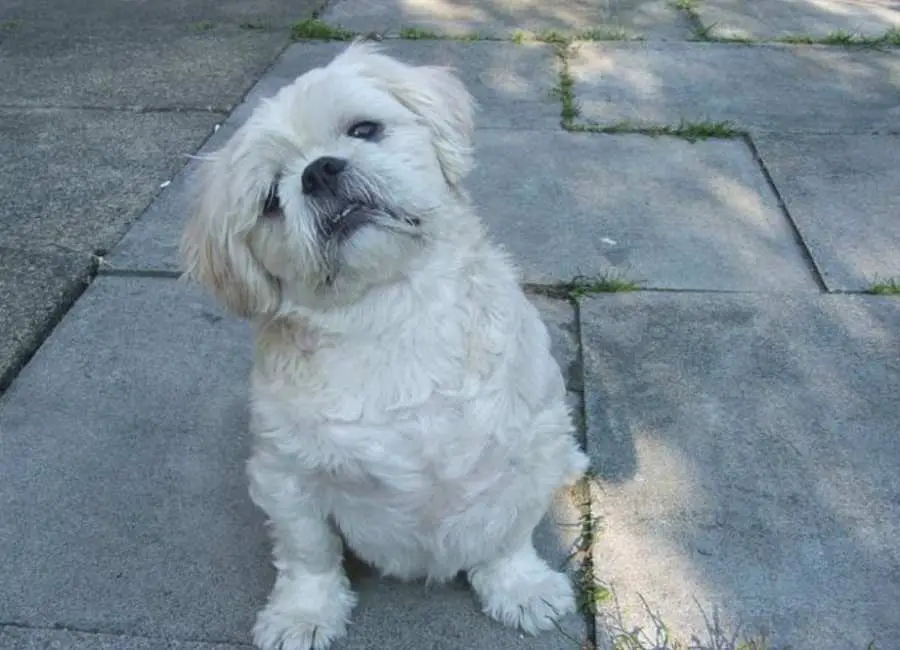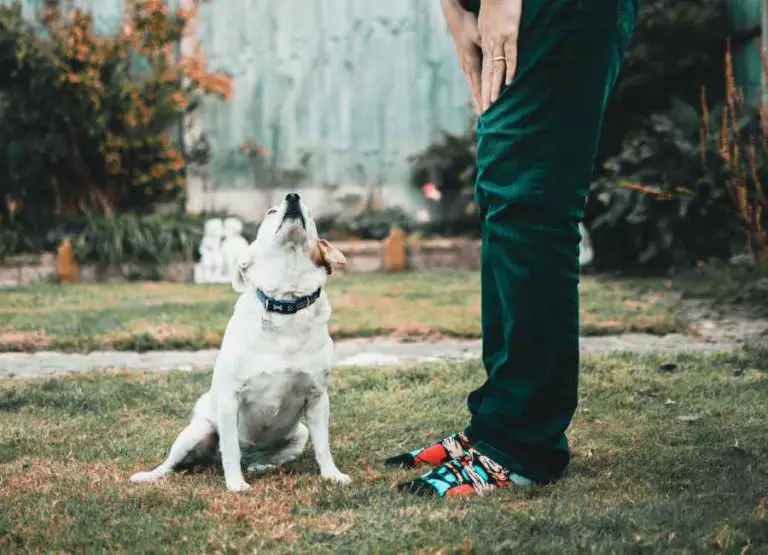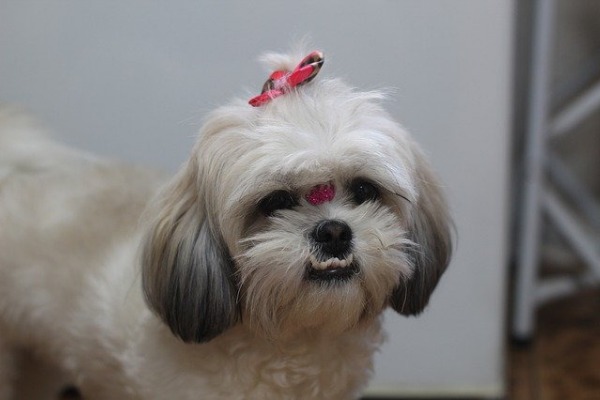How To Potty Train a Shih Tzu In 12 Easy Steps

How to potty train a Shih Tzu is a common question among Shih Tzu lovers, and this is because most times Shih Tzu shows little potty training difficulties.
Shih Tzus are a wonderful breed of dogs but can become stubborn if not properly trained.
In this post, we will be discussing the common steps in potty training a Shih Tzu which can become difficult if not properly trained.
So, keep reading to find out how to potty train a Shih Tzu…
How long does it take to potty-train a Shih Tzu
A Shih Tzu needs a lot of patience, determination, and consistency to successfully complete potty training, which can take anywhere from 3 to 6 weeks on average.
How hard is it to potty-train a Shih Tzu puppy
Shih Tzus may be a bit challenging to toilet train if you don’t have the necessary time, patience, and consistency. This is because they frequently won’t obey directions until they receive a reward or treat.
A Shih Tzu may often be trained in 3 to 6 weeks with consistency.
How To Potty Train a Shih Tzu

Training Guidelines
Here are the potty training guidelines for Shih Tzus:
| Age of Shih Tzu | Potty holding time | Number of times to go outside |
| 2 to 7 Weeks | 1-2 Hours | 9-10 times (per day) |
| 7 to 12 Weeks | 2-3 Hours | 6-8 times (per day) |
| 10 to 16 Weeks | 3-4 Hours | 5-6 times (per day) |
| 15 to 20 Weeks | 4-5 Hours | 4-5 times(per day) |
| 6 Months or more | 4-5 Hours | 3-4 times (per day) |
Let’s look at the steps involved…
Here are some intriguing pointers for teaching your Shih Tzu to use the restroom;
1. Choose a potty training method
You can choose a potty training method that is appropriate for your Shih Tzu.
The optimal potty training technique for your Shih Tzu will depend on your dog’s particular personality and learning style.
There are a few different potty training techniques available.
Most Shih Tzu learn best via trial and error, while some Shih Tzu benefit from a more regimented method.
Whatever approach you decide on, make sure to be persistent and patient throughout.
The 10-day strategy is one well-liked approach to Shih Tzu potty training.
Using this method, you set aside 10 days for potty training and forbid your Shih Tzu from donning diapers.
You routinely accompany them to the restroom and coax them into using it.
This approach may cause stress for both you and your Shih Tzu, but if you persist with it, it could work.
The use of rewards is yet another typical toilet training technique.
This method involves giving your Shih Tzu a little treat or token as a reward for using the restroom.
You may use this to encourage your Shih Tzu, but be careful not to overdo it because they can start anticipating rewards before using the restroom.
2. Pick the right time to start potty training
Timing is crucial when deciding whether to toilet train your Shih Tzu, and it relies on a number of variables.
Such as your availability, your dog’s age, your location, the area you have available for your dog, and your dog’s general health.
You should begin potty training your adorable puppy the moment you get them home from the breeder.
You might want to start potty training your dog straight immediately since it’s important that they understand how to use the facilities in your house.
The more quickly you can educate the Shih Tzu, the sooner your dog will learn how to use the potty appropriately.
3. Develop commands for the potty training
When your Shih Tzu understands the command, you may stop potty training. This method makes life easy for both you and your Shih Tzu.
There are really just two words you should teach your Shih Tzu, and even once they completely comprehend what they imply, you should continue to use them.
Teach your Shih Tzu the words “go pee” and “go poop,” and use those words when you get to the location.
Reward your Shih Tzu when he craps or pees, and continue doing this cycle until your Shih Tzu connects feces and pee with using the bathroom.
4. Pay attention to pick up on the signs
It is advisable to maintain your composure and avoid becoming irritated with your puppy if accidents do occur.
Because doing so would just make them afraid and stressed out, which will actually lead to more unforeseen catastrophes.
It’s a good idea to understand how to spot indicators that your Shih Tzu has to go potty in order to prevent accidents in the house.
Take your puppy outside right away to use the restroom if they exhibit any of these symptoms.
- Smelling the ground.
- Going around the space.
- Looking agitated and worried.
- Getting into a place they have used the restroom before.
- Running in circles
- Running back and forth in the same room
- Whining
- Barking at you
- Staring at your face
- Sniffing and running around you
5. Confinement training
If you can’t give oversight, confine your Shih Tzu. Keep your Shih Tzu in a container or a small, enclosed space only.
There are times when you can’t offer your dog your complete attention, such as late at night or while working.
Here, crate training makes sense. In many situations, especially when attempting to train your dog, using a crate can make your life less stressful.
The little amount of room in the crate is designed to keep your dog from going to the bathroom there.
Shih Tzu dogs will retain their resting place for as long as possible since they are naturally sanitary and do not wish to dirty it.
Puppies that are younger than 12 weeks old do not have full bladder control and can only keep waste for the same amount of time.
Particularly if you live in a place where you are unable to give a space outside your house, the leash and crate are crucial.
You won’t need to cage train your dog if you live in an open environment; all you need is patience, time, and consistency.
If you will be gone from home for an extended amount of time, which is not recommended for Shih Tzu, crate training is necessary.
Make careful to offer a larger crate and divide it into two portions when crate training your Shih Tzu.
Your Shih Tzu will have two sections: one for toilet or peeing, and the other for sleeping or playing with toys.
6. Teach your Shih Tzu how to use the potty area
Your Shih Tzu should have easy access to the bathroom; it shouldn’t be tucked away.
There should be a path leading down to the spot, free from any impediment or diversion.
Put your Shih Tzu’s leash on as soon as you observe any abrupt changes in his behavior, and walk him through the walkway you’ve made.
Do not forget to utilize the verbs “go poop” and “go pee.”
Use the term “poop” or “pee” when you get to the location. Don’t rush your Shih Tzu; let him take his time.
For at least two days, don’t clean up the place you want your Shih Tzu to utilize in case it returns the following day and smells the area.
If you clean up the area, your Shih Tzu will take longer to become used to the same place or site since they will start to associate it with going potty or urinating.
7. Take your Shih Tzu outside regularly
Take your Shih Tzu last before night and first thing in the morning.
This will assist mold or direct your dog’s behavior when it comes to going potty.
During toilet training, you should take your Shih Tzu outdoors a certain number of times each day, as shown in the chart above, depending on your dog’s age.
There is no set timeframe in terms of months or days for potty training your dog, but on average it might take anything from one to three months for your Shih Tzu.
8. Take your Shih Tzu outside after every meal
This is an intriguing method for encouraging your Shih Tzu to defecate after meals in a designated area.
After you’ve finished feeding your Shih Tzu, put a short leash on him, instruct him in toilet training, and then immediately take him outside to the location you want him to defecate.
Keep an eye out to see whether they defecate, and if they do, always give them conventional treats rather than food as a reward.
Shih Tzu frequently need to go pee right after meals since their stomachs have been filled, and they need to empty their bowels.
9. Take your Shih Tzu outside after sleeping or playing
Put a leash on your Shih Tzu as soon as he awakens from sleep, give the instruction, and lead him outside to the designated area or part you wish to use.
Many bodily processes take place when your Shih Tzu is resting, and these processes result in the development of feces, which your dog will want to evacuate in order to feel comfortable.
When your Shih Tzu awakens from sleep, he is typically extremely frail, so be sure to carry him to the location where he may relieve himself.
Put your Shih Tzu on a leash and lead him or her to the designated area you want them to use after a long game or stroll.
Keep an eye out to see whether your Shih Tzu goes potty, and remember to always praise your dog when they use the designated area.
10. Follow a potty routine
I suggest that you attend lessons at the same time every day.
While our dogs don’t think about timepieces, they are aware of potty cues.
Because of this, you shouldn’t take your Shih Tzu outside at different times of the day to confuse it.
Even though life might be chaotic, we can still maintain a routine despite the turmoil.
At regular intervals throughout the day, bring your Shih Tzu with you.
Take them outside, for instance, in the morning, after eating and drinking, after being in your room or chest, and just before going to bed.
11. Reward good potty behavior
Shih Tzus are a very intelligent breed of dog and can be difficult to teach, but you can always persuade them to complete any assignment using goodies.
Treats are one of the simple strategies for making potty training a success. Reward excellent conduct at all times.
Rewarding your Shih Tzu will expedite the process of toilet training for both of you. Here are some food you can use as treats for your Shih Tzu.
When toilet training isn’t going as you’d hoped, don’t lose your cool; instead, promote excellent behavior by rewarding it.
12. Be patient, consistent and avoid Punishment
Take your time when potty training your Shih Tzu because training a dog to use the toilet is never simple.
After achieving your goals, you’ll feel content.
During your Shih Tzu’s toilet training, accidents will occur sometimes; do not reprimand them or correct them negatively.
If you discipline them, they will contain their urination and defecate or pee in secret locations, which can give you more issues.
Instead of sitting and screaming, address the situation instead since screaming won’t get you anywhere.



![Fear Aggression in Dogs [Signs, Causes & More] Fear Aggression in Dogs](https://petcreeks.com/wp-content/uploads/2023/10/barking-1819740_640.jpg)


![Are Pomeranians Aggressive [Triggers & Control Tips] Are pomeranians aggressive](https://petcreeks.com/wp-content/uploads/2022/01/Are-pomeranians-aggressive.jpg)